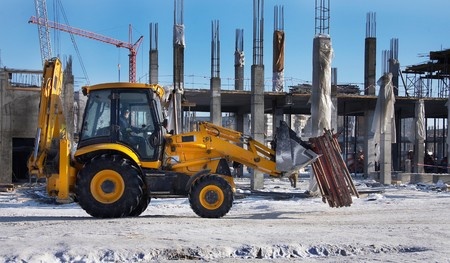Cold weather can be harsh, even your toughest machines. That’s why it’s important to do some prep work on your equipment before the winter season is in full swing. Those few minutes spent doing a little extra work ahead of time could end up saving you a lot of money on repairs.
Whether you plan on working through the freezing temperatures and snowy weather or storing your equipment until spring, pay careful attention to your machines’ engines before the weather gets too cold. Make sure that everything is lubricated properly, that the oil is changed, and check for water or contaminants in the fuel.
 You should also pay special attention to your vehicles’ batteries. Make sure that the batteries are fully charged and in working condition. If you’re planning on storing your equipment for the winter rather than using it, it’s generally best to remove the battery temporarily and store it somewhere warm. If you need to use the equipment sporadically throughout the winter season, you can use a trickle charger to ensure the battery stays properly charged at all times.
You should also pay special attention to your vehicles’ batteries. Make sure that the batteries are fully charged and in working condition. If you’re planning on storing your equipment for the winter rather than using it, it’s generally best to remove the battery temporarily and store it somewhere warm. If you need to use the equipment sporadically throughout the winter season, you can use a trickle charger to ensure the battery stays properly charged at all times.
Don’t forget about your tires. Underinflated tires will slip and slide more easily, so make sure that your tires are pressurized at the correct level. Counterweights can cause unnecessary extra stress on the tires in the cold weather, so remove them when you can. Don’t forget to do a visual inspection of your tires, looking for signs of wear or cracking, be sure to replace balding tires immediately as bald, worn tires will give you less traction and can be dangerous to drive on.
To help keep your equipment safe during the winter months, consider adding extra crane mats to your jobsite this season. Crane mats can provide safe, stable, slip-resistant work surfaces or temporary roads and access points, giving you a solid foundation to complete work on any job site. Ritter Forest Products has an extensive selection available for purchase and rent, with custom lengths available to suit your specific needs. Contact us 24/7 for more information or request a quote online now.
The most important tip that we can give you is to be safe: alter your work patterns when necessary based on severe cold temperatures or dangerous weather. Don’t forget to warm up your equipment before you start on a project, and remember that being prepared today can save you from a headache tomorrow!








